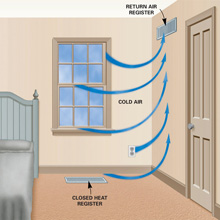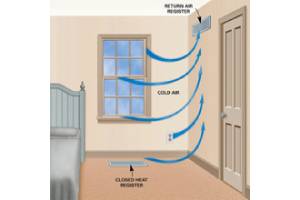Some homeowners close the air registers in unused rooms in an attempt to save energy. You might think this would allow the furnace to heat only the rooms that are occupied, and that a lot of energy would be saved. However, the conventional wisdom within the heating industry is that this practice will not save much energy and might even damage your system! Here’s why:
Closing registers may result in more cold air being drawn in from outside.
A furnace blows air out of registers that are usually positioned near the edges of a home. These registers are usually placed on the floor (in warm climates they may be placed near the top of walls or on the ceiling). The air then travels back to the furnace through return air vents. These are usually placed low on the walls near the centre of the home (see the below image from Family Handyman Magazine).

However, if you close air registers around the outside of the home, the furnace will still have to suck air in through the return air grills to keep running (the return air grills usually cannot be closed). This air would normally be emitted by the registers, but if the registers are closed, cold air from the outdoors may be sucked inside the home. In this situation, closing air registers might actually increase your energy costs (and make your home more drafty).
Closing registers may result in more duct leakage
A study by Lawrence Berkeley National Laboratory showed that closing air ducts can actually result in higher energy costs due to increased duct leakage. When registers are closed, pressure will increase in the ductwork, which may result in more air being forced out cracks. Especially in cases where the ductwork is located in an attic or crawlspace, this may result in heat being lost instead of entering the home.
The study was done on air conditioning systems where ducting was often placed in the attic. Losses might not be as significant in heating systems where the ductwork is in walls or under the floor, as much of the heat will still enter the home. However, it might not end up in the rooms you want (largely defeating the purpose of closing the registers in the first place).
Closing registers might damage your system
If you have an older furnace, closing off too many registers may reduce airflow across the heat exchanger (the main component of the system). This may result in the heat exchanger overheating and possibly failing prematurely, and might also cause more heat to be lost up the chimney. Newer furnaces are better able to increase the speed of the fan motor to generate enough airflow to prevent damage to the furnace, but having the motor work harder will eliminate some of the energy savings.
For air conditioners, closing registers may result in the indoor coil freezing up due to an inability to transfer enough heat to the air passing over it. This will also put more strain on the compressor (the main component of an air conditioner), and potentially reduce system life.
In conclusion….
In some cases, closing registers may result in energy savings without damaging your heating or air conditioning system. But in many (perhaps most) cases it will result in little to no energy savings. Generally, the advice of heating & air conditioning professionals remains to leave all registers open in most circumstances.
You can save up to 40% on heating costs by installing a new high efficiency furnace. Visit our furnaces page to learn more.



